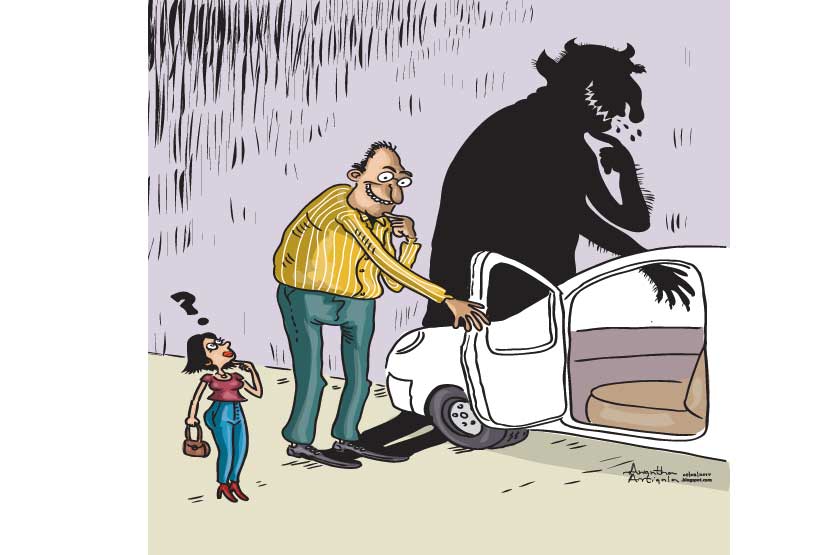Mar 07 2017.
views 3072As the world celebrates International Women’s Day tomorrow, many women’s rights activists have once again started to question the topic of equal rights and what they have achieved over the years. Feminist ideologies still prevail to influence certain attitudes and behaviours of the opposite sex.
At one point in time, a woman expected a man to hold doors open for her or to give her a lift on her way home, but today this act is often interpreted on a sexist tone.
“The man holding a door for you has a crush on you” or “the one giving you a lift is urging for a one-night stand” are the thoughts that cross the mind of a woman.
When taking a few instances into account, it is quite evident how feminism has influenced the opposite sex to become less chivalrous and often leave women stranded in their own egoistical mindsets.

Giving an ear to women’s rights
More than 40 years after women’s liberation became part of radical politics, it seems incredible that there is still so much confusion and division about what feminism is. There have been great changes in women’s lives over the past few decades and some of these include openness to sexuality, millions of mothers going to work, the right to vote, women involved in new industries and professions, acceptance of women working outside of home and the right to control their own sexuality.
In Sri Lanka for instance women have received quite a lot of attention and this seems to be improving. Requests such as 25% representation of women in parliament have raised eyebrows of the male-dominated cabinet and on the other hand, the corporate world is steadily being conquered by women. Hence, there are many more improvements and changes that need to be done in order to progress as a nation that supports equality for all its citizens.
To be chivalrous or not: that is the question...
Back in the day a man helping a woman out in case of an emergency or as a ‘gentlemanly’ gesture was received as a chivalrous gesture. A polite ‘Thank you’ came in return with a pleasant smile on the woman’s face. But today if the same encounter takes place, the woman would feel rather insecure and would have second thoughts about the man. Why is it not alright to be chivalrous? And where was it misinterpreted?
Chivalrous behaviour is described as benevolent because it flatters women and leads to their preferential treatment. But it is sexist because it relies on the ‘gendered premise’ that women are weak and in need of protection while men are strong.
But on the other hand, in Sri Lanka you could hardly expect a man to stand up and offer a seat to a woman in a bus, unless she is carrying a baby or is pregnant or is an elderly person.
“There wasn’t any chivalry in Sri Lanka to begin with,” says Chandrika Gadiewasam, a journalist and blogger.
“However it was practised by middle-aged men in developed countries but I don’t think it existed in Sri Lanka. According to my knowledge, respect for any person itself has declined. In the villages, we have seen people respecting each other for good qualities, being honest and other values but today we see people respecting others for power, fame and wealth. In fact they do not even respect elderly people anymore.”

In his point of view, budding actor and author of ‘Shakespeare on Cocaine’ Biman Kasun Wimalaratne says that women too have played their role in this - if we assume that men have become less courteous.
“It is rare, you meet a lady. For the girls out there looking to be ladies, appreciate a man who holds the door open for you, whether he is courting you, or not. Simply say, thank you. If you are a hardcore feminist screaming equal rights, hold the door open for men too. And to the men I say, be gentle, be a man - a gentleman.”
Feminism in the 21st century
As we move into 2017, feminism has suddenly taken on new dimensions; we see celebrities trying to identify with it. From exposed breasts to various other trends, equality is taking on new dimensions that is sometimes taking people by surprise.

“By the looks of it, all over the world, nothing much has changed in terms of feminism,” says Grace Wickremasinghe, founder of the F Word Project. “But there is hope for us. As a feminist myself, I believe that it’s all about breaking stereotypes and educating people about certain myths and pre-conceived notions about gender, sexuality and basic human rights. In terms of clothing, it has been about choice and choice alone. Society is filled with sexists either way and both men and women have constantly told women what to wear. But my ideology is that it’s her body and her choice. Therefore it all boils down to racism, sexism and homophobia. The same nudity that empowers one woman is similar to the modesty that empowers another. Whether it’s a burka, bikini, saree or short, it’s all about her choice and style.”

Drama director and actress Shanuki De Alwis says that globally people have become more tolerant towards feminist perspectives.
“There is an acceptance of self-confidence. If a girl wants to drink or smoke, it’s her personal choice but I’m a bit more conservative on this aspect. In Sri Lanka, women in urban areas smoke and drink more often than women in the rural areas.”
Conclusion
The etymologies of the words ‘chivalry’and ‘feminism’ are lost in time and perhaps this is why the two seem to be perpetually at odds with one another. But at its core, chivalry can be described as the intersection of ideal knightly qualities, including but not limited to courtesy, generosity, valour and of course, an ability to take up arms. While not all of these characteristics are as applicable today as they were in days of yore, these are the same basic principles that should guide all human behaviour, regardless of gender.
1 Comments
S.P.RAMKUMAR says:
Mar 11, 2017 at 06:15 pmOffering help to woman or man can be unaccepted or accepted, Taking help from others with suspicious mentality is not good. However we Sri Lankan have strong and good culture and respecting women as Goddess, Mother, Sister and the wife. writer's intention is really good and more moderate ideas than Conservative mentality.